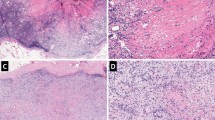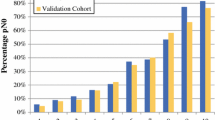Abstract
Background: The benefits of primary tumor downstaging and assessment of chemoresponsiveness have resulted in expanded applications for induction chemotherapy. However, the pathologic evaluation and prognostic significance of response in preoperatively treated lymph nodes have not been defined.
Methods: The axillary lymph nodes of 71 patients with locally advanced breast cancer treated with induction chemotherapy were evaluated for histological evidence of tumor regression as defined by the presence of nodal fibrosis, mucin pools, or aggregates of foamy histiocytes.
Results: Complete pathologic response in the breast and axilla occurred in 10 patients (14%); 19 (26.8%) had evidence of tumor regression in 1 or more lymph nodes. Patients without nodal metastases and no evidence of tumor regression had the best outcome (median disease-free survival, 31.5 months; relapse rate, 27%). Patients with residual nodal metastases and no evidence of treatment effect had the worst outcome (median disease-free survival, 19.8 months; relapse rate, 55%). The median disease-free survival was 22.1 months, and the relapse rate was 32% for patients with histopathologic evidence of tumor regression in the axillary lymph nodes.
Conclusions: Detection of treatment effect in axillary lymph nodes after induction chemotherapy identifies a subset of patients with an outcome intermediate between that of completely node-negative and node-positive patients. The axillary lymph nodes of patients receiving preoperative chemotherapy should be routinely analyzed for the presence of these features.
Similar content being viewed by others
REFERENCES
Kuerer HM, Newman LA, Smith TL, et al. Clinical course of breast cancer patients with complete pathologic primary tumor and axillary lymph node response to doxorubicin-based neoadjuvant chemotherapy. J Clin Oncol 1999; 17: 460–9.
Fisher B, Brown A, Mamounas E, et al. Effect of preoperative chemotherapy on local-regional disease in women with operable breast cancer: findings from the National Surgical Adjuvant Breast and Bowel Project B-18. J Clin Oncol 1997; 15: 2483–93.
Fisher B, Wolmark N, Mamounas E, et al. Effect of preoperative chemotherapy on the outcome of women with operable breast cancer. J Clin Oncol 1998; 16: 2672–85.
Newman LA, Buzdar AU, Singletary SE, et al. A prospective trial of preoperative chemotherapy in resectable breast cancer: predictors of breast-conservation therapy feasibility. Ann Surg Oncol 2002; 9: 228–34.
Wolff AC, Davidson NE. Primary systemic therapy in operable breast cancer. J Clin Oncol 2000; 18: 1558–69.
Makris A, Powles TJ, Ashley SE, et al. A reduction in the requirements for mastectomy in a randomized trial of neoadjuvant chemoendocrine therapy in primary breast cancer. Ann Oncol 1998; 9: 1179–84.
Kuerer HM, Sahin AA, Hunt KK, et al. Incidence and impact of documented eradication of breast cancer axillary lymph node metastases before surgery in patients treated with neoadjuvant chemotherapy. Ann Surg 1999; 230: 72–8.
McCready DR, Hortobagyi GN, Kau SW, Smith TL, Buzdar AU, Balch CM. The prognostic significance of lymph node metastases after preoperative chemotherapy for locally advanced breast cancer. Arch Surg 1989; 124: 21–5.
Hunt KK, Ames FC, Singletary SE, Buzdar AU, Hortobagyi GN. Locally advanced noninflammatory breast cancer. Surg Clin North Am 1996; 76: 393–410.
Broadwater JR, Edwards MJ, Kuglen C, Hortobagyi GN, Ames FC, Balch CM. Mastectomy following preoperative chemotherapy. Ann Surg 1991; 213: 126–9.
Hansen N, Morrow M. Current status of axillary node dissection. In: Singletary SE, ed. M.D. Anderson Solid Tumor Oncology Series: Breast Cancer. New York: Springer, 1998: 155–70.
Singletary SE, McNeese MD, Hortobagyi GN. Feasibility of breast conservation surgery after induction chemotherapy for locally advanced breast cancer. Cancer 1992; 69: 2849–52.
Peoples G, Heaton K, Booser D, et al. Breast conservation therapy for large primary and locally advanced breast cancers after induction chemotherapy (abstract 25). Abstract presented at: Society of Surgical Oncology 51st Annual Cancer Symposium; March 15, 1998; San Diego, CA.
Bonnadonna G, Veronesi U, Brambilla C, et al. Primary chemotherapy to avoid mastectomy in tumors with diameters of three centimeters or more. J Natl Cancer Inst 1990; 82: 1539–45.
Kuerer HM, Newman LA, Smith TL, et al. Clinical course of breast cancer patients with complete pathologic primary tumor and axillary lymph node response to doxorubicin-based neoadjuvant chemotherapy. J Clin Oncol 1999; 17: 460–9.
Abrams JS. Adjuvant therapy for breast cancer—results from the USA consensus conference. Breast Cancer 2001; 8: 298–304.
Rouzier R, Extra JM, Klijanienko J, et al. Incidence and prognostic significance of complete axillary downstaging after chemotherapy in breast cancer patients with T1 to T3 tumors and cytologically proven axillary metastatic lymph nodes. J Clin Oncol 2002; 20: 1304–10.
Breslin TM, Cohen L, Sahin A, et al. Sentinel lymph node biopsy following neoadjuvant chemotherapy for breast cancer. J Clin Oncol 2000; 18: 348–86.
Haid A, Tausch C, Lang A, et al. Is sentinel lymph node biopsy reliable and indicated after preoperative chemotherapy in patients with breast carcinoma? Cancer 2001; 92: 1080–4.
Nason KS, Anderson BO, Byrd DR, et al. Increased false negative sentinel node biopsy rates after preoperative chemotherapy for invasive breast carcinoma. Cancer 2000; 89: 2187–94.
Mamounas E. Sentinel node biopsy following neoadjuvant chemotherapy in breast cancer: results from NSABP B-27 (abstract). Abstract presented at: Proceedings of the American Society of Clinical Oncology; May 19, 2002; Orlando, FL.
Balch GC, Mithani SK, Richards K, Beauchamp RD, Kelley MC. Prospective evaluation of the accuracy of sentinel lymphadenectomy after preoperative chemotherapy for locally advanced breast cancer (abstract 66). Abstract presented at: Society of Surgical Oncology 55th Annual Cancer Symposium; March 16, 2002; Denver, CO.
Miller AR, Thomason VE, Yeh IT, et al. Analysis of sentinel lymph node mapping with immediate pathologic review in patients receiving preoperative chemotherapy for breast carcinoma. Ann Surg Oncol 2002; 9: 243–7.
Stearns V, Ewing CA, Slack R, et al. Sentinel lymphadenectomy after neoadjuvant chemotherapy for breast cancer may reliably represent the axilla except for inflammatory breast cancer. Ann Surg Oncol 2002; 9: 235–42.
Author information
Authors and Affiliations
Corresponding author
Rights and permissions
About this article
Cite this article
Newman, L.A., Pernick, N.L., Adsay, V. et al. Histopathologic Evidence of Tumor Regression in the Axillary Lymph Nodes of Patients Treated With Preoperative Chemotherapy Correlates With Breast Cancer Outcome. Ann Surg Oncol 10, 734–739 (2003). https://doi.org/10.1245/ASO.2003.03.081
Received:
Accepted:
Issue Date:
DOI: https://doi.org/10.1245/ASO.2003.03.081




